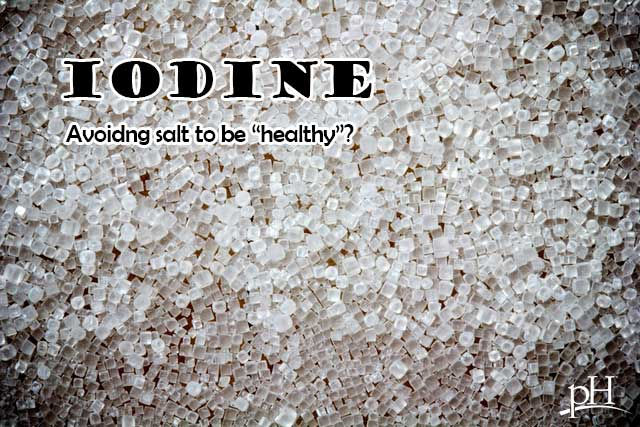Is iodine deficiency on your radar?
11 years ago | Nutrition
Photo credit: Aaron Stidwell. Used with permission under Creative Commons license.
By pH health care professionals
Iodine deficiency isn't on the radar for most Americans. As you’ve heard on the news, most people in the U.S. eat too much salt, and common table salt is "iodized" with this essential nutrient.
Many baby boomers have been avoiding salt for years, since salt was demonized as a cause of high blood pressure. This stern message trickled down to younger people, and now there are growing concerns that salt avoidance may be leading to undiscovered iodine deficiency.
What are the health risks associated with iodine deficiency?
Symptoms of iodine deficiency include frustration, depression, intellectual disability, goiter, abnormal weight gain, decreased fertility, coarse skin, constipation and fatigue.
Multiple studies have concluded that low-salt, vegetarian diets are high risk for iodine deficiency. While this has implications for thyroid issues in normal adults and children, you should also be aware that a lack of iodine increases the chances of still birth in expectant mothers.
How do you get iodine in the first place?
It was the first essential nutrient to be discovered, and the ocean is the main source of naturally occurring iodine. That explains why consuming fish can get iodine to healthy levels. Seaweed has been used in Asia since 2300 BC to cure goiter. Food-growing land near the ocean is especially rich in the element, but minerals in landlocked areas contain it as well. American dairy has iodine, mainly because livestock feed has iodine added in.
Non-grass-fed dairy can give you iodine. For vegans, seaweed (available in vegan sushi or as a dry packaged snack) and potatoes are your best bets. Garlic, lima beans, Swiss chard, summer squash, sesame seeds, soybeans, turnip greens and spinach are rich in iodine as well. Even some food preservatives, like potassium iodide, contain the nutrient.
Daily iodine requirements for adults are 150 micrograms per day. There are about 95 micrograms of iodine in just ¼ teaspoon of iodized salt. Sea salt, despite being from the sea, is not a great source of iodine. A urine test of your iodine level can determine whether you are getting enough in your diet.
Modern nutrition and food distribution mean that there is no reason for people in the Western world to be deficient in iodine. Enjoy this easy way to keep your thyroid healthy.
How do you know if you’re iodine deficient?
Take the guesswork out of it. Come into Proactive Health Labs to get your iodine levels checked. Call us at 855-PHLABS1 or visit our Santa Monica location.
Enjoy Your Healthy Life!
The pH professional health care team includes recognized experts from a variety of health care and related disciplines, including physicians, attorneys, nutritionists, nurses and certified fitness instructors. This team also includes the members of the pH Medical Advisory Board, which constantly monitors all pH programs, products and services. To learn more about the pH Medical Advisory Board, click here.







